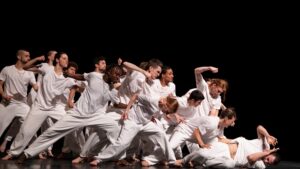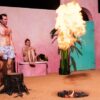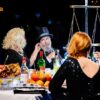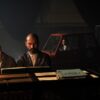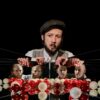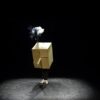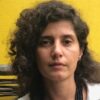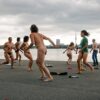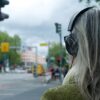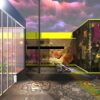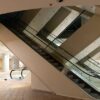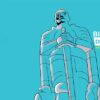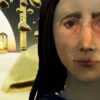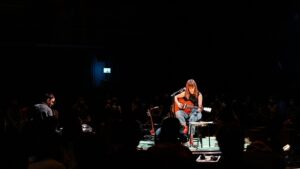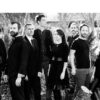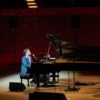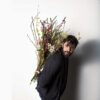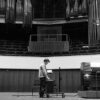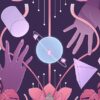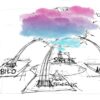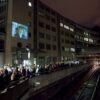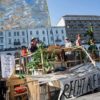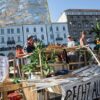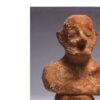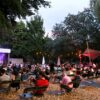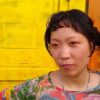

Dear guests,
now that, here in Hamburg at least, there are more vaccinated people than rapid antigen pop-up test centres, an end to the pandemic is imaginable and the next Summer Festival is in sight: the programme is online - and it is anything but a slimmed-down version. Breezing along on the tailwind from last year (where we were able to hold a complete, corona-safe festival), we stoically continued planning, enduring lockdowns, exhaustion and every phrase that starts with "home". This was not without the support from artists who continued working during the crisis, creating new, alternative perspectives for the future - and this festival, about which you will know basically everything after the following 1.925 words.
We start on August 4 with a world premiere from Canadian artist (Leslie) Feist. Like all musicians, she literally lost her stage to the virus. So, Feist wrote new songs and thought about how to get back to performing, together with stage designer Rob Sinclair (who also designed David Byrne's AMERICAN UTOPIA, one of the most brilliantly staged concert of recent years). MULTITUDES is the result and is Feist's offering to the audience to reconquer the stage, together and mindfully, in an intimate setting with her and her new songs. Communal joy! Togetherness! Just like the slogan of this year’s festival. Our community of the living, however, especially in the pandemic, constantly faces the deceased. In REQUIEM: FIRE IN THE AIR OF THE EARTH, Kyle Abraham reminds us of the dead in such a rousing way that it is clear to see why he is one of the most exciting American choreographers today: Abraham casually switches from the ballet pose to the hip-hop move and offers a Black perspective on the present - and on the classic of Western mourning music: Mozart's REQUIEM. The funeral mass sounds impressively new here, in a futuristic version by club music avant-gardist Jlin. The Lacrimosa from the REQUIEM, in a sense Mozart's musical "light at the end of the tunnel," also features at an earlier point in the festival, as a leitmotif in the pharmaceutical setting of Christoph Marthaler's new theater production DAS WEINEN (DAS WÄHNEN) (Crying (The Vaining)), based on texts by Swiss artist Dieter Roth. The much-raved play of the hour or "Marthaler at his best" (Deutschland Radio) represents the summit meeting of two Swiss artists who have found the extraordinary in the everyday, expanding the concept of art and consolidating an axis between Hamburg and Switzerland. Dieter Roth, who shaped and changed the art of the 20th century with paintings from mould and sculptures from chocolate, set up an entire museum of his own works spanning his creative period in a Hamburg villa before his death. Simply called Dieter Roth Museum, this is where the festival journey continues: we have asked interdisciplinary artists such as Annika Kahrs and Felix Kubin to engage with Roth's work in the form of an audio guide through the Roth Museum. It is a pathos-free kind of soulful humour that connects Roth and Marthaler; and that also characterises the work of Swiss artist Thom Luz. Asked how he would describe what his and Christoph Marthaler's works often have in common, Luz said: "Whenever something is missing or language is not enough, people start singing." This notion is depicted in his through-composed theatre production LIEDER OHNE WORTE (Songs Without Words), showing how people can survive crises and accidents with wit and a great deal of music. Being human, it's not easy - but easier to cope with in Swiss dialect, as the supergroup Dino Brandão, Faber and Sophie Hunger show us with their album ICH LIEBE DICH (I Love You): "Ich ha probiert mich selbst zsi, aber ich han g'merkt es isch de Horror" sings Faber with melancholic self-irony („I tried to be myself, but realised it was horror”). The trio is one of four collaborations with and in our little partner venue at the harbour, Hamburg’s new landmark Elbphilharmonie (which will also host performances featuring our friends from North America Martha and Rufus Wainwright, stargaze with the Dirty Projectors and the Turkish music avant-gardist Gaye Su Akyol).
But back to dialect: Robert Walser wrote his play DER TEICH (The Pond) in Bärndütsch (Bern dialect). It is the story of a young boy who, feeling unloved, fakes his own suicide. The play is staged by Gisèle Vienne, a theatre art specialist for mental abysses, in a French translation with German surtitles - and a sensational acting duo: Ruth Vega Fernandez and Adèle Haenel ("Portrait of a Lady on Fire"). A disturbingly delightful chamber play that can also be read as a commentary on the psychological strain experienced by families during the pandemic. The view on another species under psychological strain is directed by Norwegian how-to-improve-theater-group Susie Wang. In their latest work LICHT UND LIEBE (Light and Love), a German couple with sunburn finds itself in the vacation spot of their dreams. This bliss doesn't last long, however, in the Ibsen Award-nominated play, quickly unravelling into a parable of the longing for vacation, exoticism and normality in times of a pandemic. Festival regular Miet Warlop brings us a similar kind of bitterly-wicked theatre, certainly not suitable for those audiences who enjoy dozing off during performances. With AFTER ALL SPRINGVILLE, she presents a new staging of one of her greatest form and colour spectacles, which has seen her conquer European stages for the past decade. Expect moving tables and exploding fuse-boxes galore. From this point, it is only a small step into real magic, provided by Hamburg's magician of all magicians, Manuel Muerte, under the more-than-fitting title ILLUSIONS. Yes, yes, we love to entertain you too. And that's why we're now leaving the festival grounds of Kampnagel and heading to the epicentre of entertainment, St. Pauli and the legendary club Uebel&Gefährlich. There, the queer Austrian guerrilla folk-theatre group Nesterval transports Thomas Mann's Buddenbrooks into the informal subculture, supported by the Kampnagel karaoke veteran group Queereeoké: SEX DRUGS & BUDD'N'BROOKS is an elaborate, immersive entertainment show, suitable even for people who find it impossible to connect Thomas Mann or theatre at all with fun. From the North German merchant saga, the festival moves on to the former Kaufhof warehouse in the city centre. Left empty by the pandemic, it will be occupied by the Hamburg headphone performance specialists LIGNA with a new performance piece running for three weeks: DIE GESPENSTER DES KONSUMISMUS (The Ghosts of Consumerism) is a performative journey through a part of Hamburg's history and into the future of inner-cities. In times of social distancing, these areas have become problem zones and sources of contagion, just like proximity, togetherness and coming together; in other words, elements that constitute our very society. In THIS IS NOT NORMAL, summer festival legend Juan Dominguez, together with Arantxa Martínez, will bring interpersonal closeness back to the city centre, through their performance of living sculptures in public places. This piece is one of a total of 14 outdoor projects which will see the summer festival play throughout the city, as part of Hamburg’s culture summer: With the HAMBURG SEA WOMEN PARADE, Geheimagentur presents an overdue feminist perspective on seafaring; Yolanda Gutiérrez and artists from former German colonies intervene at the Bismarck Monument on St. Pauli; Rimini Protokoll turn the city into a stage with artistic audio walks; A Wall is a Screen project short dance films on building facades throughout Hamburg; and Abhishek Thapar gives a voice and a face to invisible, exiled kitchen helpers in Hamburg's restaurants: BELASTBAR UND SAUBER, DRINGEND GESUCHT (Resilient and Clean, Urgently Needed) is being realized as part of the EXIL HEUTE program with the Körber Foundation and uses a local example to open up a global perspective on the pandemic. There it is again, the pandemic, because rarely has the connection between local restrictions and global movement been made so clear to us as in the case of infection - and climate change. At the end of the day, we are a global community, and what is happening in the Amazon right now affects us as well, no doubt. Brazilian artist Gabriela Carneiro da Cunha tells us about this with her techno-shamanistic piece ALTAMIRA 2042, in which she gives a voice to an endangered river from the Brazilian rainforest, creating a feminist vision of the future for the year 2042.
The future, another pandemic topic, not only because of the hypothetical course of infection curves and intensive care bed capacities, but also because of the digitalisation of life, thinking, working, everything. A topic where there are lots of different views to be heard, but which suffers from a male dominance that often leads to the marginalisation of more interesting voices. That's why we're hosting our opulent conference, THE FUTURE OF CODE POLITICS, where feminist programmers and groups like Indigenous AI, Google-fired AI specialist Timnit Gebru, or Africanfuturism author Nnedi Okorafor will come together to discuss the ecological consequences and decolonisation of technologies. And because we are sort of serious curators, there will also be some appropriate artistic works on the complex topic of digitalisation. But don't worry, no online theatre, but rather a virtual reality piece I AM (VR) from forward-looking theatre artist Susanne Kennedy, which will let visitors meet a digital oracle of Delphi. Or an international hack-a-thon by visual artist Christoph Faulhaber. And from Hamburg artist Kotkta Gudmon, there is a walk-in installation at the harbour and an elaborate virtual reality staging in the main church of St. Katharinen. Speaking of churches: there's light at the end of the tunnel, not only musically with Mozart, but also with two concerts in St. Gertrud’s Church near Mundsburg. First with Graindelavoix, the avant-garde vocal ensemble for early music from Antwerp. You won't hear a better or more thrilling interpretation of Renaissance polyphonic vocal music than in their concert production THE LIBERATION OF THE GOTHIC. And Michael Schönheit, the Leipzig Gewandhaus organist himself, is coming to St. Gertrud’s Church to discover the contemporary organ, infused with the spirit of improvisation together with the young indie music artist P.A. Hülsenbeck.
So now we’re up to 8837 characters; but to be fair, it is the most extensive summer festival to date with 13 world premieres, of which 5 are major pieces on stage. A festival with a long preface – and with productions showing that art can only be relevant for the future if it is aware of the present. That also applies to the last example from the festival program and the grand hall k6: four works of style-defining choreographers combined on one evening for and by the Ballet national de Marseille, newly under the direction of the summer festival heroes (LA)HORDE: Lucinda Childs, the icon of postmodern dance, meets the form-stressing expressionist Tânia Carvalho, meets France's ballroom great Lasseindra Ninja, meets Belfast social realist and last year's Summer Festival highlight Oona Doherty.
Finally, we would need another four-digit amount of words to introduce this year’s biggest festival venue: the AVANT-GARDEN, Hamburg's most beautiful art leisure park, designed by JASCHA&FRANZ, featuring resident artists JAJAJA, and delicious delights from the Kampnagel house-and-heart restaurant Peacetanbul. On several stages there will be a daily changing, sprawling programme including concerts by album-of-the-year-title-predecessors like Sophia Kennedy, book presentations by Johanna Adorján or Juliane Liebert, the classic format SOLICASINO by Migrantpolitan and several performances by festival-evergreen Canadian musician Josh "Socalled" Dolgin. And by the way, on weekends there is always an avant-garde-can-be-fun children's program in the afternoon.
Great, so you've read all 1.912 words till now but are still confused. Then please, just think again with Swiss serenity of Robert Walser, who, according to Thom Luz, is said to have uttered during a walk through Hamburg: "Theatre should calm the too confused and confuse the too calmed." The fact that there are people and institutions who concur with that sentence and support our festival through ideological and financial sponsorship is a great good fortune and the reason why we are able to carry out our work at all. Thank you!
And to you guests who have read this far (or skipped to the end of the text): you’re our favourites anyway and we are looking forward to seeing you in the garden very soon,
András Siebold & the Summer Festival Team

